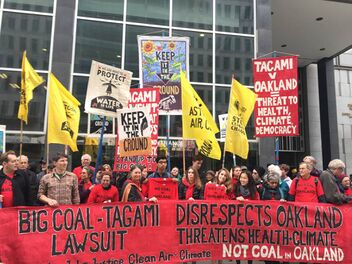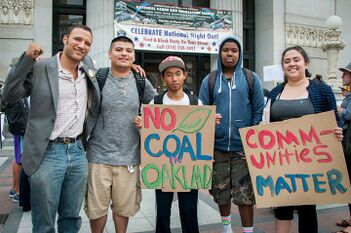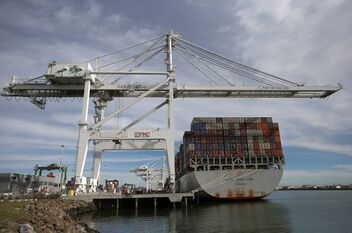Oakland, CA
In the early 2010s, developers unveiled plans to redevelop the Oakland Army Base as the Oakland Bulk & Oversized Terminal (OBOT), originally proposing transportation of low‑dust cargo like wind turbines or grain.[1] In the December 2013 Oakland Army Base newsletter, developer Phil Tagami promised not to export coal through the Oakland Bulk and Oversized terminal, writing:
"It has come to my attention that there are community concerns about a purported plan to develop a coal plant or coal distribution facility as part of the Oakland Global project. This is simply untrue. [...] CCIG is publicly on record as having no interest or involvement in the pursuit of coal-related operations at the former Oakland Army Base."[2]
Tagami made the same commitment in private meetings with the Sierra Club, elected officials, and others. In 2015, it emerged that the terminal had quietly agreed to ship up to 10 million tons of coal per year through Oakland.[3]
In response, the No Coal in Oakland movement formed, uniting local environmental justice groups (like the West Oakland Environmental Indicators Project), labor unions (e.g. ILWU), health experts, youth activists, faith leaders, and groups such as Sierra Club, Communities for a Better Environment, Baykeeper, and Asian Pacific Environmental Network. They held massive hearings, protests, and rallies to demand that Oakland reject coal exports for the sake of public health, climate justice, and local jobs. By late June 2016, under community pressure, the Oakland City Council voted unanimously to ban the handling, storage, and transport of coal (and petroleum coke) within the city (including the OBOT) citing risks to air quality, asthma, heart and respiratory disease, and environmental equity for West Oakland communities.
Since 2016, the movement against the coal terminal in Oakland has taken shape in the case Oakland Bulk & Oversized Terminal, LLC, vs. City of Oakland, in both state and federal courts. In both cases, the City of Oakland lost to OBOT, dealing a blow to the movement. However, activists have not given up and continue to be vocal in their opposition.


Litigation
2016-2020: Federal District Court
- In December 2016, OBOT (Oakland Bulk & Oversized Terminal) sued Oakland alleging breach of the 2013 Development Agreement after the City passed an ordinance and resolution banning coal handling at the proposed terminal.[4]
- A federal district court held a trial in January 2018 and concluded Oakland lacked “substantial evidence” to show the coal operation posed a significant health or safety risk. The court ruled that the City’s coal ban violated the Development Agreement and declared it invalid.[5][6]
- On May 26, 2020, the Ninth Circuit upheld that ruling, affirming the lower court’s standard of review and finding

2018–2025: State Court (2018–2025)
- After the federal decision, OBOT’s Ground Lease required the City and OBOT to hit specified development milestones by August 14, 2018. When the City terminated the lease for missing that deadline, OBOT (and its subtenant OGRE) sued in Alameda County Superior Court, claiming the City’s obstruction and the prior coal ban triggered force majeure rights and breached implied duties of good faith.
- In the initial part of the trial, the liability phase in October 2023, Alameda County Superior Court Judge Noël Wise sided with the developers, finding the City liable for breach of contract. She concluded the City's delays and refusal to cooperate prevented OBOT from meeting its obligations and triggered six separate force majeure events, including passage of the coal ban itself, failure to execute a rail access agreement, and not completing public improvements.[7]
- In January 2024, during the remedy phase, Judge Wise ruled against developers seeking nearly $160 million from the city, claiming lost profits after the city terminated its ground lease for the terminal. The judge instead agreed with attorneys for the city, who argued the group’s projected profits were speculative.[8]
June 2025: California Court of Appeal
- The City appealed Judge Wise's decision. On June 27, 2025, the First Appellate District affirmed Judge Wise’s ruling.[9] The court rejected the City’s arguments regarding the force majeure clause, implied covenant limits, claim preclusion, and OGRE’s right to sue. It concluded OBOT and OGRE were entitled to relief, and that the lease termination was improper.[10]
- The victory in court reopened the possibility of reviving terminal development for OBOT.
- As of July 1, 2025, The City may seek review of the Court of Appeal’s decision by the California Supreme Court.[11][12]
No Coal In Oakland
According to their website, "No Coal in Oakland is a grassroots organization campaigning to stop the threat of coal being transported by rail into Oakland for export overseas".[13]
- specific things that the movement did to organize people
The activism against coal dust in Hampton Roads and the No Coal in Oakland campaign both center community-driven efforts to protect public health from the dangers of coal pollution. Like Hampton Roads, West Oakland has a disproportionately high rate of respiratory illness and other physical ailments, which is linked to its close proximity to the Port of Oakland, as well as truck and rail traffic.[14]
Documents
- Oakland Bulk & Oversized Terminal, LLC, vs. City of Oakland. Complaint 6. December 7, 2016.
- Oakland Bulk & Oversized Terminal, LLC, vs. City of Oakland. Opening Brief of Intervenor-Defendants-Appellants. December 10, 2018.
- Oakland Bulk & Oversized Terminal, LLC, vs. City of Oakland. Finding of Fact and Conclusions of Law. March 15, 2018.
- Lora Jo Foo. Covers for rail transport of coal. June 2, 2016.
- Aker, G. RE: Expert Report of H. Nadia Moore, Ph.D., DABT, ERT in the matter of Oakland Bulk & Oversized Terminal, LLC v. City of Oakland, Sierra Club and San Francisco Baykeeper. Case No. 3.16-cv-07014-VC. October 6, 2017.
- Fernandez-Pello, C. Oakland Bulk & Oversized Terminal v. City of Oakland Fire and Explosion Safety at the Proposed OBOT Facility. October 6, 2017.
- de Place, E. Northwest Coal Exports. November 2012.
- Health Concerns About Coal Export in the Northwest. PowerPastCoal.org. November 2013.
- Sahu, R. Oakland Bulk and Oversized Terminal (Plaintiff) v. City of Oakland (Defendant) Expert Report of Dr. Ranajit (Ron) Sahu. October 6 2017.
- Oakland Bulk and Oversized Terminal (Plaintiff) v. City of Oakland (Defendant). Expert Report of Stephen M. Sullivan. October 6, 2017.
- Oakland Bult & Oversized Terminal, LLC, V. City of Oakland. Volume 1. May 15, 2018.
- Oakland Bult & Oversized Terminal, LLC, V. City of Oakland. SIERRA CLUB AND SAN FRANCISCO BAYKEEPER’S NOTICE OF APPEAL AND REPRESENTATION STATEMENT. June 19, 2018.
- Oakland Bult & Oversized Terminal, LLC, V. City of Oakland. Volume 3. January 03, 2018.
- Oakland Bult & Oversized Terminal, LLC, V. City of Oakland. Volume 4. February 16, 2017.
- Oakland City Council. Ordinance No 13385 C.M.S. July 20, 2016.
- Chafe, Z. Analysis of Health Impacts and Safety Risks and Other Issues/Concerns Related to the Transport, Handling, Transloading, and Storage of Coal and/or Petroleum Coke (Petcoke) in Oakland and at the Proposed Oakland Bulk & Oversized Terminal. June 22, 2016.
- Public Health Advisory Panel on Coal in Oakland. An Assessment of the Health and Safety Implications of Coal Transport through Oakland. June 14, 2016.
- Matier & Ross. Opponents of Oakland coal shipping target governor's pal. July 25, 2015.
- Oakland Army Base (OARB) Area Redevelopment Plan. City of Oakland. April 29, 2002.
- OAKLAND BULK & OVERSIZED TERMINAL, LLC v. CITY OF OAKLAND. APPELLANTS’ JOINT EXCERPTS OF RECORD.
- Oakland Bulk & Oversized Terminal, LLC, vs. City of Oakland. FIRST APPELLATE DISTRICT DIVISION TWO. June 27, 2025.
References
- ↑ Siler, T. (2018, January 16). Oakland, Port Developer Head to Trial in Dispute Over Coal Ban. Kqed.org; KQED.
- ↑ Fight for a Coal-free Oakland. Sierraclub.org. 2018.
- ↑ Wolfe, E. Oakland loses appeal in coal legal battle. The Oaklandside. June 30, 2025
- ↑ Fight for a Coal-free Oakland. Sierraclub.org. 2018.
- ↑ Our Campaign. No Coal in Oakland. 2018.
- ↑ BondGraham, D. Judge Rules in Favor of Oakland Coal Project | East Bay Express | Oakland, Berkeley & Alameda. East Bay Express | Oakland, Berkeley & Alameda. May 15, 2018.
- ↑ Klein, J. Despite Trial Decision, Hope Remains to Keep Coal Out of Oakland. March 29, 2024.
- ↑ Johnson, S. Judge Denies Developer's $160 Million Suit Against Oakland in Ongoing Coal Terminal Battle. January 23, 2024.
- ↑ Oakland Bulk and Oversized Terminal v. City of Oakland. Justia Law. 2025.
- ↑ Oakland Bulk & Oversized Terminal, LLC, vs. City of Oakland. FIRST APPELLATE DISTRICT DIVISION TWO. June 27, 2025.
- ↑ City Loses Appeal in State Court Lawsuit. No Coal in Oakland. July 1, 2025.
- ↑ Oakland Effort To Bloick Fossil-Fuel Exports Suffers Second Judicial Setback. 2020.
- ↑ Our Campaign. No Coal in Oakland. 2018.
- ↑ oaklandexplore. (2025, June 11). West Oakland Air Pollution Trends: 20 Years of Data, Health Impacts & Demographic Shifts - Oakland Explore. Oakland Explore.